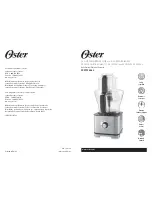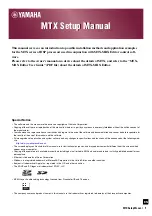
SPN Mixers
LECTROSONICS, INC.
6
Introduction
The ASPEN digital matrix provides a maximum of 48
total outputs, but there is no limit to the number of in-
puts that can be added to a system by stacking multiple
units. Input only units deliver outputs to the digital bus,
so they are always used with a host mixer or confer-
ence unit to provide physical audio outputs.
ASPEN Series mixers are built around two “building
block” board assemblies. One is an 8 in/12 out mixer,
and the other is a 16 channel input only design. These
two building blocks are combined in various configura-
tions to create various processor models:
• SPN812 8 input, 12 output mixer, 1 RU
• SPN1612 16 input, 12 output mixer, 2 RU
• SPN1624 16 input, 24 output mixer, 2 RU
• SPN2412 24 input, 12 output mixer, 2 RU
Input only processor models include:
• SPN16i 16 channels, 1 RU
• SPN32i 32 channels, 2 RU
Other processor models include:
• SPNConference teleconference Interface, 1 RU
• SPNDNT Dante network interface, 1 RU*
All models fully support the 48 outputs provided by the
digital matrix, regardless of how many physical outputs
are present on the rear panel. Any physical output can
deliver the signal from any output in the matrix.
Every input includes a dynamic noise reduction filter to
enhance dynamic signals and suppress steady state
noise. This unique algorithm is a single ended, frequen-
cy selective process that significantly reduces noise
from one or multiple sources.
When multiple units are stacked, Master and Slave
units are automatically detected and configured. All
data and audio from the Slave units in the system is
gathered in the Master, so a single connection between
a computer and the Master allows access to all units in
the stack. The throughput latency of all audio inputs in a
stack is automatically synchronized to maintain abso-
lute signal phase at the audio outputs.
Quick Start Essential
Settings
Install the ASPEN Software before connecting
the processor to the computer USB port.
Wiring and Cable Connections
All inputs, outputs and control devices must be securely
connected following the pinouts and polarity shown on
pages 7 thru 9.
Interconnect Multiple Units
When multiple units are used, interconnect them via the
ASPEN ports on the rear panels. (see page 9)
Critical Settings for Mixer Models
Several settings must be made before the processor will
pass signals correctly:
• Input levels must be set
• Crosspoints must be defined
• Output levels must be set
The settings can be made using the computer interface
or with the LCD. (see pages 10 and 16)
Special Settings for SPN Conference
If the sound system includes an SPN Conference pro-
cessor, two of the final mixes must be used to generate
the input signals for the AEC (acoustic echo canceller)
and another mix must be routed to the telephone send
connection. Details for this critical setting are included
in the Installation Guide for the SPN Conference.
Signal Processing
Audio quality is significantly improved by using the vari-
ous signal processing functions included in all channels.
There is no “gas gauge” and no limitation of DSP re-
sources regardless of how many processes and stages
are enabled.
Every input channel includes settings for:
• Delay
• Noise reduction filter
• Equalization
• ADFE (auto digital feedback eliminator)
• Compressor
Every output channel includes settings for:
• Delay
• Equalization
• Compressor
• Limiter
*SPNPower12 is to be developed at a future date







































